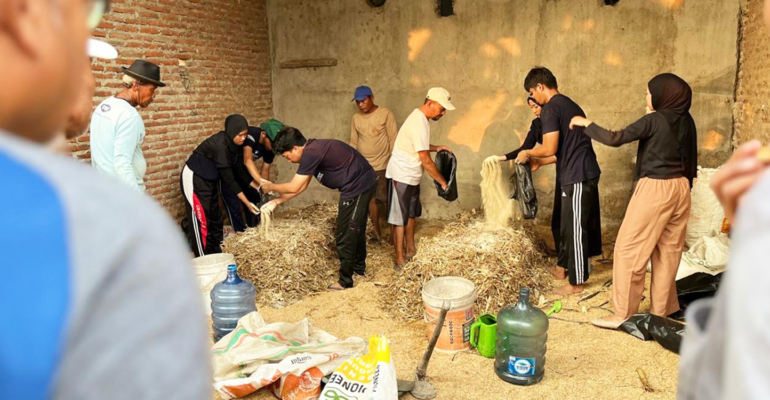Turning Agricultural Corn Waste into More Useful, KKNT Innovation Team Introduces Compost to Farmers and Ranchers

Combining agricultural and livestock waste, IPB University students have successfully introduced compost to the people of Ketileng Village, Tegal, Central Java.
Students who are currently carrying out the Innovation Real-Thematic Work Lecture introduced compost making to the farmers and ranchers of Ketileng Village. The event took place at the Ricemill of the village head and was attended by 26 farmers and ranchers from Ketileng Village.
The activity began with a presentation of the material by Alfi Fitria Syawalina, an IPB University student. “Composting is the process of decomposing organic matter with the help of microorganisms, which produces compost with a low C/N ratio,” explained Alfi.
“Composting can also be used to reduce the problem of organic waste in the village. This compost is made using agricultural waste in the form of corn stalks and livestock waste in the form of sheep manure, then mixed and given EM4 bacteria as a decomposer,” continued Alfi.
This activity not only provided new knowledge but also motivated the residents to be more concerned about the environment. The application of simple techniques such as composting is expected to be a real solution to the problems faced by the community on a daily basis.
In this activity, the residents were taught how to make and benefit from compost for agriculture and livestock in Ketileng Village. Alfi explained that the composting technique has many benefits, such as reducing agricultural and livestock waste, improving soil structure, and reducing the provision of waste disposal sites.
After the material presentation, the participants were immediately invited to practice making biopore holes together. In this practice, the residents made two compost piles with dimensions of 1 x 0,5 x 1 meter. The enthusiasm of the residents was very high in participating in this activity. (*/Rz) (IAAS/Aly)



